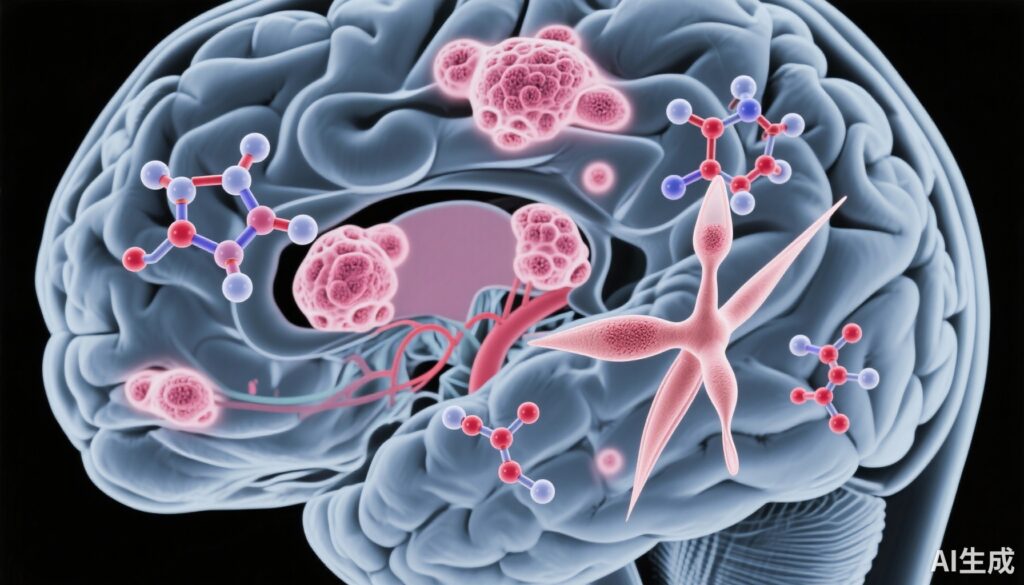Highlight
– The combination of utidelone and bevacizumab achieved a central nervous system (CNS) objective response rate of approximately 43% in ERBB2-negative metastatic breast cancer patients with active brain metastases.
– Median progression-free survival reached 7.7 months with CNS-specific progression-free survival extending beyond 10.6 months.
– Treatment demonstrated a manageable safety profile with no reported serious or fatal adverse events.
– These findings reveal potential therapeutic advances for a population with limited treatment options and poor prognosis.
Study Background and Disease Burden
Metastatic breast cancer (MBC) remains a leading cause of cancer-related morbidity and mortality worldwide. Within this heterogeneous disease, the ERBB2 (formerly HER2)-negative subtype constitutes a majority of cases but features fewer targeted treatment options compared to ERBB2-positive breast cancer. Among patients with MBC, brain metastases signify a particularly devastating complication, often associated with neurological deficits, impaired quality of life, and markedly reduced survival. Existing management strategies—including local radiotherapy, surgery, and systemic chemotherapy—yield limited durable control in this setting, especially for ERBB2-negative disease. Consequently, there is an urgent clinical need for efficacious systemic therapies capable of penetrating the central nervous system (CNS) and improving outcomes in this vulnerable cohort.
Study Design
The U-BOMB trial is a multicenter, nonrandomized phase 2 clinical study conducted at five hospitals in China. It enrolled adult female patients diagnosed with ERBB2-negative metastatic breast cancer who presented with either untreated or progressive brain metastases after prior local therapy. The enrollment period spanned from May 5, 2022, to October 25, 2023, with a data cutoff on May 20, 2024.
Intervention consisted of administering bevacizumab intravenously at 15 mg/kg on day 1 combined with a 5-day course of utidelone at 30 mg/m2 per day, repeated every three weeks. Treatment continued until documented disease progression or intolerable toxicity. The primary efficacy endpoint was the central nervous system objective response rate (CNS-ORR), evaluated by Response Evaluation Criteria in Solid Tumors (RECIST) version 1.1. Secondary endpoints included progression-free survival (PFS), CNS-specific PFS, overall survival (OS), and safety outcomes.
Key Findings
The study enrolled 47 female patients with a median age of 53 years (interquartile range 45–59). Of these, 35 had newly diagnosed brain metastases without prior treatment, while 12 experienced progression following local radiotherapy.
The CNS objective response rate per RECIST v1.1 was 42.6% (95% confidence interval [CI], 28.3%–57.8%). Response Assessment in Neuro-Oncology Brain Metastases (RANO-BM) criteria yielded a similar CNS-ORR of 40.4% (95% CI, 26.4%–55.7%). The median follow-up time was 11.0 months (ranging from 2.3 to 23.6 months).
Median progression-free survival was 7.7 months (95% CI, 5.6–9.7), while median CNS-PFS was notably longer at 10.6 months (95% CI, 8.4 months to not reached). Overall survival median was 15.1 months (95% CI, 12.0 months to not reached), reflecting a meaningful survival extension in this difficult-to-treat population.
The safety profile was manageable. The most common grade 3 or higher treatment-emergent adverse events were lymphopenia (in 10.6% of patients) and leukopenia (6.4%). No serious or treatment-related fatal adverse events were reported during the study, indicating the combination to be well tolerated.
Expert Commentary
The U-BOMB phase 2 trial provides encouraging evidence that combining utidelone, an epothilone analog with microtubule-stabilizing properties, and bevacizumab, an anti-vascular endothelial growth factor (VEGF) monoclonal antibody targeting tumor angiogenesis, yields significant intracranial tumor control in ERBB2-negative MBC patients with active brain metastases.
Historically, patients with brain metastases from ERBB2-negative breast cancer have limited systemic therapeutic options due to poor blood-brain barrier penetration and intrinsic tumor resistance. The demonstrated CNS response rates and progression-free survival in this trial surpass outcomes typically observed with conventional chemotherapies and support the biological plausibility of simultaneous microtubule targeting and angiogenesis inhibition for controlling brain metastatic lesions.
Nonetheless, as a single-arm, nonrandomized study without a control comparator, findings require cautious interpretation. Confirmation in randomized controlled trials is essential to establish efficacy definitively and evaluate long-term safety. Additionally, the trial’s focus on a Chinese patient population may necessitate validation across diverse ethnic groups to ensure generalizability.
Overall, these results represent a promising advance in addressing an unmet need and suggest that systemic regimens incorporating utidelone and bevacizumab warrant further clinical investigation in metastatic breast cancer brain metastasis management.
Conclusion
The U-BOMB phase 2 trial highlights the potential of combining utidelone and bevacizumab as an innovative therapeutic strategy for patients with ERBB2-negative metastatic breast cancer complicated by active brain metastases. The regimen demonstrated substantial intracranial activity, extended progression-free and overall survival, and acceptable tolerability. These promising outcomes support further randomized clinical trials to validate efficacy and potentially broaden treatment indications for this high-risk population with limited currently available options.
References
Yan M, Lv H, Liu X, Wang S, Geng C, Song Y, Liu Z, et al. Utidelone Plus Bevacizumab for ERBB2-Negative Metastatic Breast Cancer and Active Brain Metastases: The U-BOMB Phase 2 Nonrandomized Clinical Trial. JAMA Oncol. 2025 Aug 1;11(8):883-889. doi:10.1001/jamaoncol.2025.1694. PMID: 40569584; PMCID: PMC12203392.


